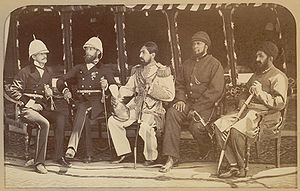- Mohammad Yaqub Khan
-
Mohammad Yaqub Khan Amir of Afghanistan 
Mohammad Yaqub KhanReign February 21, 1879 - October 12, 1879 Born 1849 Died November 15, 1923 Predecessor Sher Ali Khan Successor Ayub Khan Dynasty Barakzai dynasty Father Sher Ali Khan Mohammad Yaqub Khan (1849 – November 15, 1923) was Emir of Afghanistan from February 21 to October 12, 1879. He was the son of the previous ruler, Sher Ali Khan.
Mohammad Yaqub Khan was the governor of Herat province in Afghanistan and decided to rebel against his father in 1870 but was imprisoned in 1874.
The Second Anglo-Afghan War erupted in 1878, leading Sher Ali Khan to flee the capital of Afghanistan, and eventually die in February 1879 in the north of the country. As Sher Ali's successor, Yaqub signed the Treaty of Gandamak with the British in May 1879, relinquishing control of Afghanistan foreign affairs to the British Empire. An uprising against this agreement lead by Ayub Khan in October of the same year ended the rule and abdicated of Yaqub Khan. He was succeeded by the new ruler, Amir Ayub Khan.
Contents
Treaty of Gandamak
 Gandamak, Afghanistan in May 1879. Seated from left to right: British officers Mr. Jenkyns and Major Cavagnari, Amir Yakub Khan (in the centre), General Daoud Shah and Habibullah Mustafi.
Gandamak, Afghanistan in May 1879. Seated from left to right: British officers Mr. Jenkyns and Major Cavagnari, Amir Yakub Khan (in the centre), General Daoud Shah and Habibullah Mustafi.
During the Second Anglo-Afghan War, the British defeated the Amir Sher Ali's forces, wintered in Jalalabad, waiting for the new Amir Yakub Khan to accept their terms and conditions. One of the key figures in the negotiations was Pierre Louis Napoleon Cavagnari. A half-Irish, half-Italian aristocrat, descended from the royal family of Parma on his father's side, he had been brought up in England, with schooling at Addiscombe. He served with the East India Army in the 1st Bengal Fusiliers and then transferred into political service, becoming Deputy Commisssioner at Peshawar, and was appointed as envoy by the Viceroy Lord Lytton in the 1878 mission to Kabul which the Afghans refused to let proceed. This refusal was one of a series of events which led to the Second Afghan War.
In May 1879, Yakub Khan travelled to Gandamak, a village just outside Jalalabad and entered into negotiations with Cavagnari as a result of which the Treaty of Gandamak was signed whereby the Amir ceded territories to the British and accepted a British envoy in Kabul. Cavagnari took up the post of British Resident in Kabul in July 1879. He was known to be reckless and arrogant rather than discreet and his role as envoy was viewed as injudicious even by some of the British. The situation in Kabul was tense and eventually some Afghan troops who had not been paid by the Amir rebelled and attackled the Residency, killing Cavagnari and his mission in September 1879. The war was far from over despite the treaty and British troops were recalled over the mountains to occupy Kabul, secure it and launch punitive action against the Afghans. Yakub Khan abdicated, taking refuge in the British camp and was subsequently sent to India in December.
Quotes
“ I would rather work as your servant, cut grass and tend your garden than be the ruler of Afghanistan.[1] - Yaqub Khan, to a British viceroy in the 19th century. ” See also
- List of leaders of Afghanistan
References
- ^ Raofi, Wahab (November 25, 2007), The Orange Grove: Peace plan for Afghanistan, The Orange County Register, http://www.ocregister.com/opinion/afghanistan-government-iraq-1928966-taliban-country
External links
Preceded by
Sher Ali KhanEmir of Afghanistan
1879Succeeded by
Ayub KhanCategories:- Emirs of Afghanistan
- 1849 births
- 1923 deaths
- Pashtun people
- People of the Second Anglo-Afghan War
Wikimedia Foundation. 2010.
